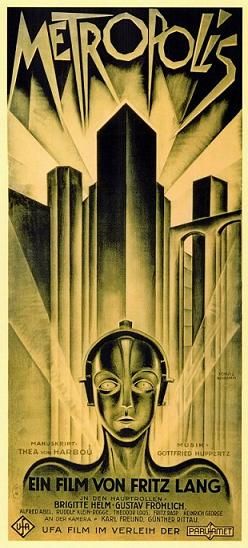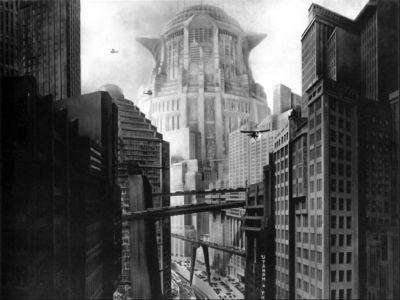Metropolis Description - Dystopian Science Fiction Movie
Metropolis is a black and white silent film directed by Fritz Lang and released in 1927. It was one of the most expensive films of that time costing 7 millions marks. It is science fiction film that provided the first visual image of far future. Lang and his wife, Thea von Harbon, wrote the screenplay in 1924 and Thea novelized it in 1926.
Metroplis's themes are connected with the political themes of that time- capitalism and communism, workers revolution against the privileged elite class, etc. The film also reveals hopes and fears and enthusiasm for technology. Much of the technology presented in the film (such as "M-machine" and "Heart Machine") is unexplained and bizzare." Machine Human", the female robot, is the ultimate expression of techology in the film. Special effects and designs featured in the film, still impress modern audience.
Metropolis is an influental and important landmark in the development of film art and has influenced many science fiction films: Dark City, Blade Runner, The Matrix, The Star Wars and Brazil.
There are multiple versions of Metropolis- original German version from 1927, the most commonly known American version edited by Channing Pollock and the second German version.
The story is set in an enormous city Metropolis in the somewhat distant future. This futuristic city is divided betwen ruling elite (planners or thinkers) who live in luxury among the skyscapers and larger population of workers who live in vast subterranean quarters and labor as virtual slaves in machine halls. The protagonist, Freder (Gustav Fröhlich), the son of city's leader John Fredersen (Alfred Abel) is oblivious to the plight of workers, until he meets Maria (Brigitte Helm), the leader of workers, who waits for the " Mediator" who will unite the two halves of society (the ruling class and working classes) since she believes that the heart would be necessary between head and hands.
Freder follows her down in the working underground, where he witnesses an explosion at the "M-machine" in the machine halls and also sees the toiling lifestyle of workers. Haunted by that, he joins her cause. When he complaines to his father about the things he saw, his father tells him that it is right for the workers to live the way they do. Freder desides to do something about it. Fredersen is concerned about his son's interest in workers' lives and he goes for advice to the scientist Rotwang (Rudolf Klein-Rogge) who has created robot replicas of human beings. Fredersen arranges with Rotwang to give the robot Maria's appearance. The real Maria is kidnapped and imprisoned in Rotwang's house.
The robot is sent among the workers to promote a revolution and eliminate them. Encouraged by the robot, the workers sabotage central machine " Heart Machine", fires and flood spread, threatening to drown their own children and Metropolis faces a disaster of biblical proportions. Realizing that "Maria" is in fact robot , Freder and workers capture it and burn it. Freder chases Rotwang, kills him and rescues the real Maria. At the end, Freder units the workers' liders and approves his role as the "Mediator".

